#good omens historical references
Text
Honolulu Roast: the story of a coup
This is a crack meta, but I think I found something. I cite as inspo and incorporate by reference this coffee shop scene breakdown by @snek-eyes and response meta by @embracing-the-ineffable
Preamble: a sign featuring the daily special isn't present, then it is:

image credit: @embracing-the-ineffable
I went searching for any kind of symbolic meaning and this is what I found (below the cut):
Honolulu is a Metaphor for the Bookshop
At first I suspected there was some connection between Freddie Mercury and Honolulu, since an instrumental version of Bohemian Rhapsody plays diegetically in this scene. But that didn't yield any results, so I tried "Honolulu Queen" and I got this.
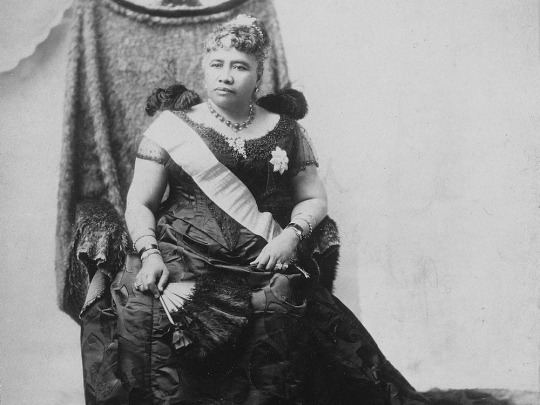
citation: Smithsonian
Liliʻuokalani, the last monarch of Hawaiʻi, came to power over the tiny independent islands as the result of an untraditional chain of succession. She only held power for two years, until she was ousted by a coup led by American plutocrat Sanford Dole (as in Dole pineapple). Ionlani Palace in Honolulu was the seat of power of the independent monarchy: the coup began with a warship anchoring in Honolulu Harbor (source). Subsequently the islands were annexed by the much larger, much more powerful United States.
In a statement, in exchange for a pardon for her and her supporters, she "yield[ed] to the superior force of the United States of America" under protest, pointing out that John L. Stevens, U.S. Minister to Hawaiʻi, who supported the provisional government, had already "caused United States troops to be landed at Honolulu."
A quote directly from the mouth of queen herself reads:
"Now, to avoid any collision of armed forces and perhaps loss of life, I do, under this protest, and impelled by said forces, yield my authority..."
Following the coup, Sanford Dole set himself up as the ruler of Hawai'i, until ceding authority to the United States.
Aziraphale = Liliʻuokalani
Who else do we know that could be characterized as the ruler of a tiny independent nation...

...that is violently invaded by an overwhelming larger force...
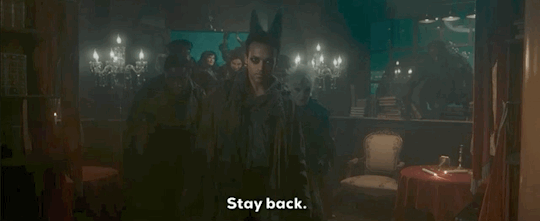
...and then forced to surrender to annexation to protect their loved ones...
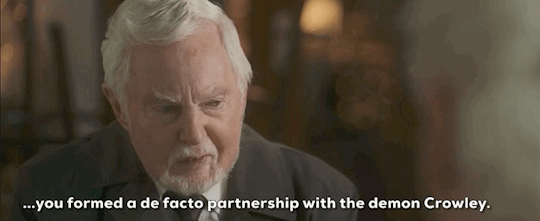
...and now their tiny independent nation is being occupied by representatives of the invading force?

I mean. C'mon. It's right there.
Metaphorical Parallelism between Heaven:Hell and Federal:Corporate
But indigo, you say, wasn't it Hell that couped the bookshop and Heaven that annexed it?
Yes. Just like Dole of Dole Pineapple, a private interest, couped Hawai'i, which would later be annexed by the United States.
Public and private interest are, theoretically, at odds, but America in particular has a long and storied history of these forces colluding and working together for common (and often sinister) purpose.
We already know that Heaven and Hell in the universe of GO have significant interests in common, such as wanting to bring about the Apocalypse (even if that common interest is in having a war with each other). The parallelism is there.
Anyways. Yeah.
Honolulu Roast.
If you liked this meta you may like: Baraqiel and Azazel
#good omens#good omens 2#good omens meta#aziraphale#metatron#fuck metatron#good omens historical references#ivoc#good omens continuity
164 notes
·
View notes
Text
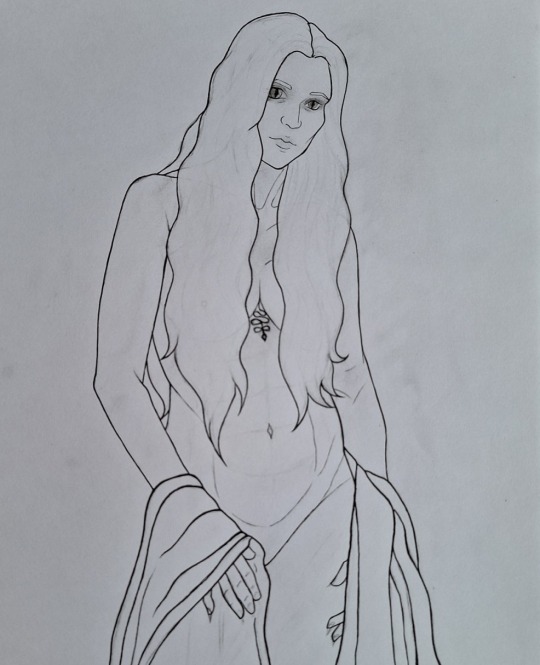
Lady Crowley, inspired by Aphrodite of Knidos.
She might as well have been the one who posed for Praxiteles.
#good omens#good omens fanwork#good omens fanart#good omens fandom#crowley#good omens crowley#fem!crowley#lady crowley#my art#my artwork#my drawing#traditional art#traditional drawing#hand drawing#sketchbook#my fanart#line art#lineart#i have never tried drawing anything remotely similar to a naked body before#well... she's not fully naked (originally she was supposed to show her breasts) but oh well just a quick drawing#i thought making the tattoo on the sternum would be the hottest thing ever#ha imagine if half the aphrodite and venus statues were crowley and she also posed for the first nude female sculpture#i found the reference on pinterest (as always) and had to do it#i doubt i'll color it or shade it this was me sticking out my neck enough already#that's what you get for letting a classical student watch go#lady crowley darling you are everything#why am i thinking so erotically about her she's my baby#aphrodite#liking good omens means putting the two clowns in random historical situation#i don't know if i'm satisfied with it but i'm glad i tried
29 notes
·
View notes
Text
What if I said I’m writing a multi-chapter fic where a certain bitter old man takes over Aziraphale’s corporation and hurts Crowley what then
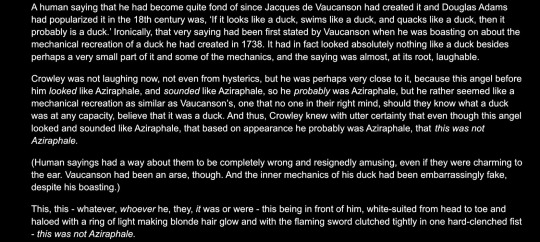
#i love using historical references in my writing#this is from ch2#ch1 should be up later i think#don’t copy#crowley#aziraphale#good omens fic#fanfic#my fic#good omens#fanfiction#ineffable husbands#good omens angst#angst#the metatron
23 notes
·
View notes
Text
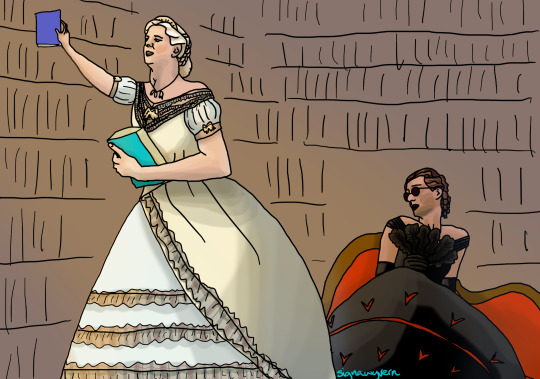
Everyone's getting excited about 1960s ineffable wives but what about 1860s instead
#this was a speedpaint except it took a while longer than those tend to#anyway i did trace the faces and arms/necks from references#so i can't take credit for those looking like that#just wanted to crank this out#symbollism/costume details to note: crowley's skirt details are devil tails#aziraphale has decorative angel wings on his bodice#and a tiara like a halo#colours are taken from their usual costumes#including aziraphale's plaid#which is not historically used as trim so that's not accurate to my knowledge but i wasn't going to draw that much plaid#and it's just an accessory on the og costume so a whole plaid dress felt wrong#crowley's fan is in the i love you position in that old timey secret fan code#it's idk 1866 or something here#crowley gets gloves because they feel appropriate to his casual sluttiness of attire#feels weird to handle books with gloves so az doesn't have any#anyway i love 1860s truly can't beat it for clothing#and idk why they're wearing evening gowns except i just prefer them to day gowns#maybe they're going to the ritz#good omens#ineffable husbands#ineffable wives#ineffible wives#ineffible husbands#aziracrow#anthony j crowley#david tennant#michael sheen#neil gaiman#terry pratchett#drawawyvern
16 notes
·
View notes
Photo
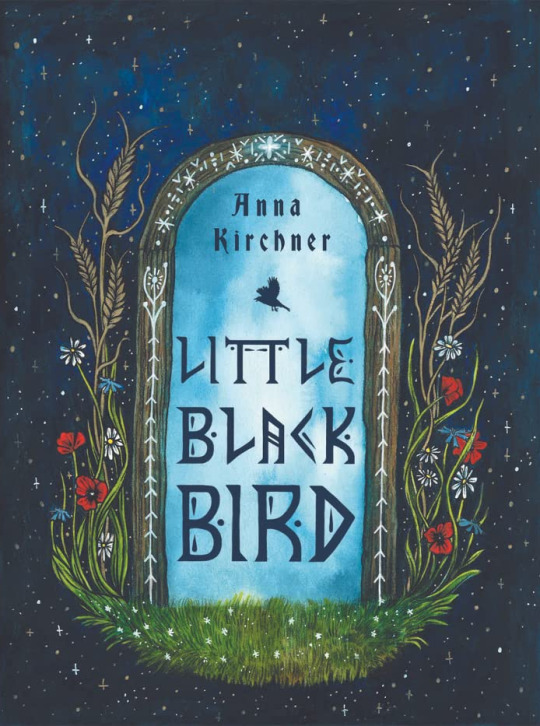
2022 reads // twitter thread
Little Black Bird
urban fantasy in Poland
a girl with telekinetic powers is forced to hide them until she's targeted by local sorcerers, and discovers their world of Slavic mythological creatures and demons
questioning aspec MC, soulmates and magical bonds
#Little Black Bird#aroaessidhe 2022 reads#well.#do you want to read shadowhunters but the MC is a 2010s tumblr girl? and it's worse?#i had assumed from the cover this was like. historical and/or folklorey#but it's very much modern urban fantasy (my fault i guess)#straight up only reason i finished it (and i skim read a Lot) is bc i try to read as many aspec books as possible#and even that was confusing.#she's a tumblr girl. and she's talking about all these confusing feelings that seems like asexuality but she hasn't heard of asexuality. but#then at the end she's like hey love interst guy i think you might be asexual you should look it up#like??? girl are you ace? why are you confused about it then? without ever using the word for yourself?#other than that. this dude just shows up by stalking her and they're soulmates i guess. this makes me instantly hate him.#there are. too many harry potter references. there are good omens references. adsom and trc references. please stop you'll make me rethink#my stance on pop culture references#at one point she bumps into a roma woman who gives her some cryptic prophecy and all she has to say about it is. there are weird roma women#around they do that sometimes it's weird. which felt. super racist. uhhh.#anyway when i say i skimmed i really skimmed so i'm sure i missed some things and at a base level it's probably fine but. yeah.
2 notes
·
View notes
Text

This week’s discord server Good Omen References study club’s theme was the crucifixion flashback ! Historical stuff is not easy for me but I wanted to try anyway !! 🙌
#gomens#illustration#artists on tumblr#good omens#good omens fanart#aziracrow#crowley x aziraphale#artistontumblr#digitalart#fanart
1K notes
·
View notes
Note
Hey Neil, I hope you're well. I just wanted to say something about the Public Universal Friend post you reblogged: the Friend did not use they/them pronouns! The Friend did not use any gender-related pronouns in fact, and was referred to by contemporaries exclusively as "the Friend" and "the P.U.F". Those referring to the Friend as "they" are projecting modern ideas of gender onto a historical person. "They/them" was not used in the PUF's time the same way it is today and it is unlikely the Friend considered using it. For historians it's a huge no-no to assign pronouns to a dead stranger, no matter how well we think the pronouns "fit" that person. The Friend's preference for zero pronoun usage was respected in the Friend's time, and I think we should be able to stand by that. That all said - the Friend was a fascinating figure, and I'm so glad many more people are learning about the Friend.
Have a good Tuesday, looking forward to Good Omens, thanks for reading a small gender rant in your inbox, etc etc etc
Your point is well made.
1K notes
·
View notes
Note
Hello and good morning/day/night :]
I was wondering, in BNF, we’ve gotten tiny little bits of information about the ‘Nice and Accurate Prophecies’ (not sure if that’s the correct title, sorry) book and TV series, if there was anything else you could tell us about it?
Character names, storylines, plots, any fun details you may have made up or otherwise, etc, etc.
I just think it’s sweet how interested both Aziraphale and Crowley are in the series, and if you might be as interested, if not more, in it too.
Thank you, and have a lovely Sunday. 🫶
this is it, my leash has snapped, i'm wild in the streets, thank u for asking; i'm gonna go be insufferable now
(hi @neil-gaiman if you see this, i think it's safe to read, but it does border on being fan fic. i'm writing a fic where crowley and aziraphale are an artist + writer in an online fandom, much like we are for good omens, and this is the fake story i've made for them to be fans of 💛)
The Nice and Accurate Prophecy
info dump of the fake 5 book series by Agnes Nutter (1985-1992) and its fake fandom:
The Nice and Accurate Prophecy
The Strange and Improbable Prophecy
The Vague and Perfidious Prophecy
The Tense and Harrowing Prophecy
The Faint and Ineffable Prophecy
a dramatic, layered story with a bizarre and unexpectedly lovable cast of characters, humour that hits you out of nowhere, and a lot of attitude from the narrator. a la Good Omens, A Series of Unfortunate Events, Hitchhikers Guide to the Galaxy
fantasy/historical fantasy and mildly action & romance
a la good omens, a witch and a witchfinder become friends and help each other throughout history, despite being on opposite sides. they get closer as they fight against the immoral plays from their prospective sides (the witchfinder army and a demonic cult the witch was born into) that each lose sight of their core values in a bid to hold more power over the world.
the story is set primarily in a medieval fantasy era, but suddenly jumps to the present in the later books, catching everyone off guard and giving a whole new context to enjoy the story. the challenges they face parallel the earlier story but in a modern take with modern technological twists. the modern era is the late 80s, since that's when it was written.
the witch reincarnates, similar to doctor who, due to a high class black magic ritual they performed in their arrogant youth (which they were NOT supposed to have access to). they've had long lifetimes where they die of old age, and others where they've barely managed to live a year. their reincarnations aren't entirely random; they will reincarnate according to their growth and preferences as a person (a la Magical Boy's magical outfit generations), which includes fluctuation in gender identity. their pronouns fluctuate depending on each "face" they wear, but have canonically been a "they" before. the good side of the fandom (crowley & aziraphale) default to they/them as an overall rule. they do have a name, but they like to change that too, so the fandom almost exclusively calls them witch, or witchy.
the witchfinder also has a name, but the fandom have taken to calling him witchfinder to match the fact that witchy is called by their role. it also helps that a lot of the witchfinder narration refers to him by role instead of name. he is human, 30ish in appearance, but at the end of the first book, the witch fears to lose him and curses him with immortality against his knowledge to try and keep him safe.
witch is crowley-coded, witchfinder is aziraphale-coded. my to-do list includes an illustration of the two of them played by michael and david :') but i picture them being kind of like newt and anathema for the most part.
ship names include witch/finder, witchwitch, w² or witch², and witchfound.
at the start of the first book, they meet and become friends without knowing each other is a witch & finder. the witchfinder is a bit bumbly, like newt, and the witch is cool and suave but neurotic and insecure like many human au variations of crowley (major overcompensation vibes). witch is male at the start of the first book. their friendship is secure when witch finds out he's a witchfinder, so there's less "oh my god i'm friends with the enemy, is he going to kill me in my sleep?" and more "ah fuck, Lets Drink About This"
there's battles, horseback riding, camping out in dark woods, disappearing and losing each other for months at a time, and many missed connections as they try to work together against two common enemies, whilst keeping up the facade that they're on their respective team's sides.
there's charged chemistry in the first book, but it's more plot heavy. there's hints of shippy moments in the 2nd book that fall in between the plot. there's a Moment of almost confession in the 3rd book, and a non romantic kiss towards the end (we gotta, for neil). they're pretty much married in the 4th book, securely at each other's side, but never actually talk about it until the end, and there's a more explicitly stated shippy connection in the 5th book.
agnes herself is a total recluse who drops books out of nowhere then goes back to existing somewhere in the english countryside (people presume). she's happy to supply signed copies to fundraisers and conventions, and sometimes random bookshops across the country will be vandalised with genuine autographs on the inside covers. she's notoriously pedantic about being involved with adaptions behind the scenes, but she has no social media and isn't ~around~. she once did a talk when she was presented with an honorary doctorate, and did a single book signing when the first Prophecy book came out, but beyond that she keeps to herself.
there are a small handful of quotes from her in behind-the-scenes footage talking vaguely about character intensions and clarifying world building, but she likes to leave things up to interpretation like neil does. it's in these few snippets of interaction we've seen from her that she's steadfastly supportive of intersectionality and lgbt rights, like staring dead-eyed at an interviewer when they ask her a ridiculously heteronormative question about the characters (like "have you read my books?")
adaptions include:
(most adaptions start like the book, with a male witch at the beginning that turns into a female witch when they first regenerate. the early ones usually change the pacing by switching to a female actor by the time they realise witchfinder is a witchfinder, unlike in the book where he's male for this scene, and there's way less Charged™ chemistry between the m/m witch/finder.)
Feature Film: late 90s, kind of cheesy, but good spirited fantasy (a la Indiana Jones). focuses on the first book alone, with hints to a sequel that never happened.
Abandoned TV Pilot: early 2000s, a little too dramatic but still a good time (a la the Dungeons and Dragons 2000, ASOUE 2004). good source of gifs and Moments™ but the fandom is generally Fine with it being abandoned.
Stage Performance: late 2000s-early 2010s, a stellar stage adaption of the first book with elements of the 90s movie. f/m witch/finder the whole way through. one cast used m/m actors but it was a short run and only a handful of fans were lucky enough to catch or remember it. crowley would give his left arm (or someone's, anyway) to have experienced it, so a fan sent him some flip phone camera footage of it that he keeps on a harddrive in his safe.
HBO Streaming Series: late 2010s-present, high quality, highly revered, resurged the fandom's popularity and spread the series further overseas. made in america, but doesn't try to americanise the series. extremely respectful to the books, with easter eggs to the film, and is working its way through the entire book series (a la The Witcher netflix series). f/m witch/finder, but has had one episode that included some flash backs/montages of different witch faces. probably like 15 minutes total screentime of a male witch played by a ncuti gatwa level/style of actor, which the fandom has giffed, edited, and screencapped to oblivion.
Several bonus books: Agnes has written a few extra books (a la The Unauthorized Autobiography of Lemony Snicket and The Beatrice Letters), as well as curated some anthologies from other authors (a la A Study In Sherlock). there are a total of 3 anthologies so far, in which other authors have written stories about the characters in their own tellings. basically like canonised, published fan fiction, curated and authorised by agnes herself. There's also an unfinished graphic novel that retells the book series (a la The Adventure Zone comic), but has been WIP/unheard of since the 3rd book.
273 notes
·
View notes
Text
How different cultures in ASOIAF view cats pt. 1
In our world, culture and religion shape how we view animals, and for this post, specifically cats. An example of how cats a view differently in cultures can be seen in Islamic cultures and Romani Cultures. Because cats clean themselves often, they are viewed as clean by Muslims and can be kept with the family. But for Romani, because of the Marime which states that the genital region is a source of impurity, a cat licking its own lower regions this becomes unclean. Roma still keep pets but they generally don’t let them sleep in their bed or lick them. This is all contrasted by American culture where a pet is viewed as a member of the family and will be referred to as the baby or child of their owners and is allowed to sleep in bed with them.
It’s so interesting and I want to expand this to how Westerosi people see cats and what types of cats they keep.
Dorne
Dorne takes a lot of inspiration from the Arabic would and I think it only makes sense for them to have a similar view of cats.
Cats keeping themselves clean makes them the perfect pets for humans. Cats are also known to pray to the seven if given a seat in a sept (cats love prayer rugs and it’s really cute). Both religious and hygienic, cats are viewed as more sophisticated than other animals and thus are kept closer by their families.
The salty Dornish are best known for their love of cats with many ancient breeds residing in their homes. The green orphans will sail with a cat or two and give them a fish from the days haul. Cats are also seen as omens of good fortune and many shops have a resident cat. Septa also keep cats control pests and because they will sleep at the feet of the seven when their statue is warm. The Turkish Van and Turkish Angora are both old and rare breeds of cats that would flourish in Dorne.
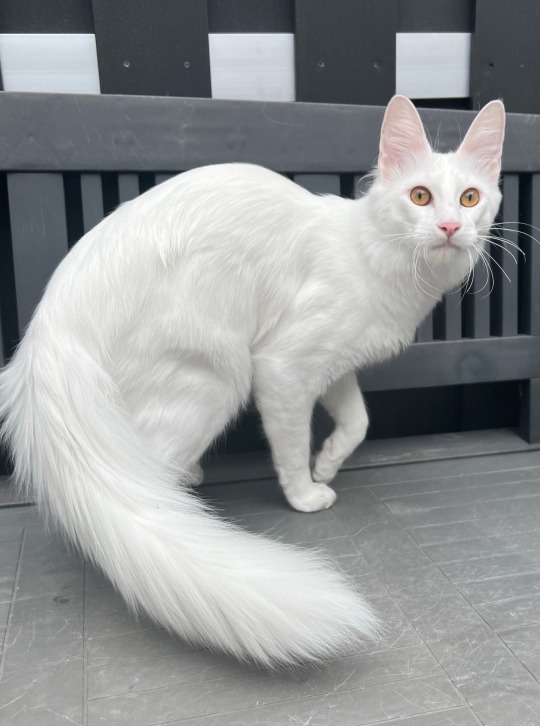

The Sandy Dornish also enjoy cats. Because cats naturally retain more water than dogs, they are fitted to live in the desert. These cats are some of the more wild ones as it’s common for the domestic cat to mix is wild cats. During harsh sandstorms, the Dornish will wrap the cats up in a blanket to protect them from the elements. Cats are known to love this and scene request it when their is no sand storm. The Savannah cat is a cross between wild Serval and a domestic short hair cat.

The stony Dornish are less attached to cats than the Sandy or salty Dornish. Every house hold does have a cat and it’s common for cats to sleep in the room of their favorite person, but the stony Dornish believe that cats have some impurity to them because they lick their own genitals. Families will often perform a cleaning ritual on their cats by wiping them down with a wet cloth to cleanse them of impurity. Cats in stony Dorne are slender and very angular, making them great at slipping through stony hills and along steep walls. The Cornish Rex and Devon Rex are popular cat breeds.


The Iron Islands
Cats were a big part of Scandinavian culture. The goddess Freya had her chariot pulled by Norwegian Forest cats (also called fairy cats) and it was custom for a groom to give his bride a kitten as a wedding gift. For Vikings specifically, cats were kept to control the pests on ship.
Because the Iron Islands is more based on mythical Viking culture than historical Scandinavian culture, we can have some fun with the cats.
Ships are a big part of the iron islands culture, so each ship should have a cat or two. Perhaps to “bless” a ship before it sets off, a kitten is brought into the ship and makes it their own. I also see the Ironman have a very communal ownership of the cats. Fisherman will give the cats some of their catch as part of a good luck ceremony and people will set up small cat houses for them. They could also view a cat staying with you as a sign of good luck. But because of Thai communal ownership, it would probably be taboo to try and keep a cat to yourself. The iron islanders see a cat as not belonging to a person but to a ship or island.
Types of cats I think the iron islanders would have. Because they’re kind of weird, I think some weird breeds would fit. The Selkirk Rex is known for playing in water, being loyal to their human, and also have some curly fur!

The Andal Kingdoms
The Andals had a similar relationship to cats that Europeans had before the Black Death. For the Andals, cats were viewed as mainly pest control for their farms and cities. People rarely tries to socialize kittens when born which led to people believing cats were naturally aggressive.
It wasn’t until Maesters discovered that cats help prevent the spread of disease by killing rats that cats became a more popular household animal.
The reach was the first kingdom to become very found of the cat. They were perfect help for their farms and perfect pest control for old town. Old Town holds a celebration of cats each year to thank them for preventing extreme disease outbreaks from happening in the city. The Redwyne family is famous for breeding Persians cats that resemble the pugs they breed with short faces. Rich families have a few Persian cats that they dress up as little lords and ladies as an extra show of wealth.


In the storm lands and riverlands, cats are seen as antithetical to the land. The kingdom’s natural wetness drives cats away. Fisherman are often at odds with local cat populations as they fight over fish. Despite the general population’s disinterest in cats, they are a common staple at inns and bars as they keep rats away from the straw and wheat. Patrons consider seeing a cat with folded ears as a lucky charm that their stay at the inn will be a pleasant one.


I reached the max amount of photos for this post so we will continue with westerlands, the vale, north, beyond the wall, and valyrians!
#asoiaf#a song of ice and fire#asoiaf headcanons#cats in asoiaf#HotD#house of the dragon#hotd headcanon#cats in hotd#I love cats
163 notes
·
View notes
Text
What do Shax and a 30-year-old Sandman comic have in common? Puns. The answer is always puns.
While I've recently revealed Shax does actually know how to spell, (she's just really old), the "angle" message Shax throws through the window to demand the "angel" one was a little trickier, because it's not Middle English, or even Old French, it's probably the oldest pun in Good Omens... it's latin.

Good Omens Season 2, Episode 5, 2023
Fortunately, a time travelling Neil Gaiman left answers for us in his 1995 Sandman special "Sandman midnight theatre." See for yourself.

Sandman Midnight Theatre, Neil Gaiman, Matt Wagner, Teddy Kristiansen, 1995
"Still, they have some illuminated manuscripts in their library which throw fascinating light on early church history. "Not angels, but angles" eh? I've been angling for permission to browse through their manuscript collection for yonks."
Appropriate for an English reverend to be curious about "Angels and not Angles". It's THE earliest christian pun, attributed to Pope Gregory the Great in the 6th century CE.
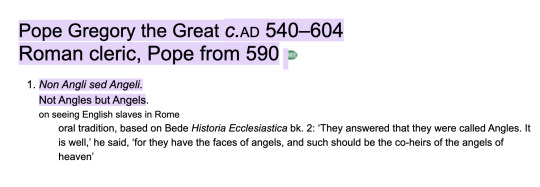
Oxford reference essential quotations
It comes from a historical account of the pope walking through a market in Rome, and seeing some exotic slave children (i.e. fair hair and blue eyes, and light skin) from what is now the England, and asking where they were from. The master replied that they were "Angles" (Angli in latin) and the pope declared them to be "Angels" (Angeli) instead, which, in latin at that time would have been a pun.
This history from Bede actually influenced a lot of the christian world, so we could conceivably make the point that fair blonde and blue eyed angels comes from the idea that they looked liked the English (who were not christian, but pagan at the time of being newly conquered). Aziraphale's looks in the originsl Good Omens are probably a direct result of the lineage in art of this 1,500 year old pun.
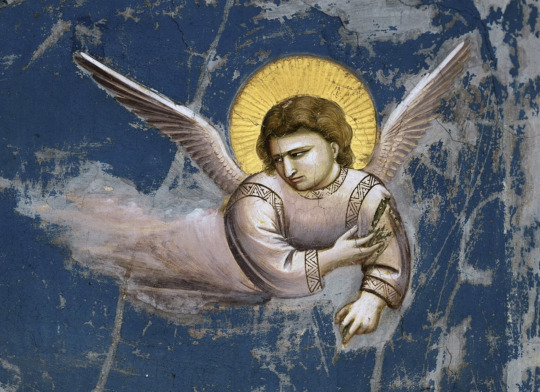
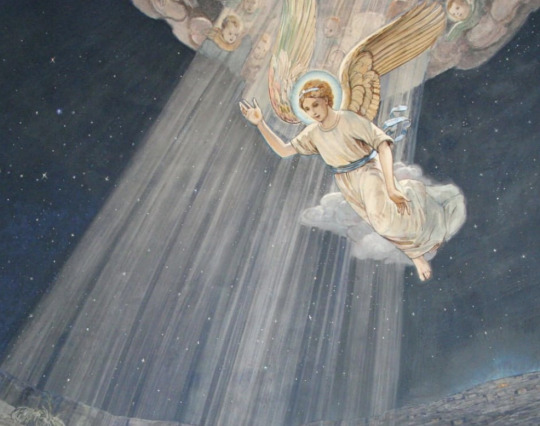
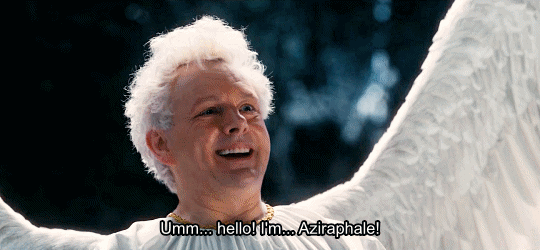
Depictions of angels, 1100 years apart
Which raises the question: if Shax is asking for the Angel Gabriel with her note, the pun doesn't make any fucking sense.
Jon Hamm plays Gabriel as an "American", specifically not English like the rest of the cast. He does have blue eyes, but as far as Shax is concerned, Gabriel's eyes are violet, not really a human colour. Shax could just actually be stupid (I guess?) and not realize that in modern English that constitutes a mistake (boring), or that Americans succeeded in 1776 (hilarious). But here's a quirkier theory: Shax knows what she's talking about, and she's gunning for Maggie.
If you look really closely, demons show up and start hanging around the street earlier in the ball than you would guess. Once a fair number have amassed, they stay waiting for Shax to lead them. However, even though she hasn't shown up yet, they eagerly chase Maggie down the street from her shop. They're only stopped by Crowley, and Maggie gets safely into the ball.

Once inside, she has quite a stunning change of costume, highlighting her blonde hair and blue eyes:

There's so much more evidence to suggest that Maggie isn't really a normal human, but this post is long enough. What I will say is that it's subtle, but once the demon attack really gets going (no thanks to Maggie), Shax and the other demons never look for Jim once, even when he leaves the mezzanine. They concentrate all their efforts on Aziraphale, Maggie and Nina, and never mention Gabriel again.
While Maggie is a Scottish name, and she clearly has some links to Scotland if a random pub in Edinburgh is buying records from her in Soho, she does have a distinctly English accent, and lest we forget...
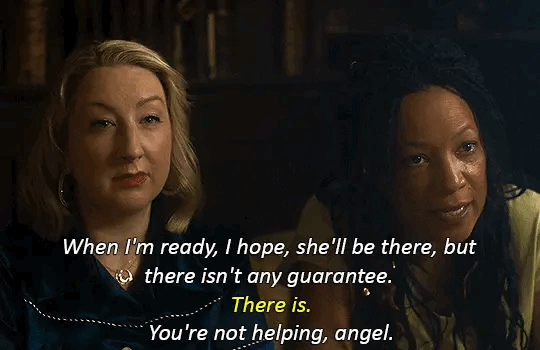
———————————————
thanks as always to @embracing-the-ineffable and @thebluestgreen for the tasty links and sounding board.
#good omens meta#good omens 2#art director talks good omens#go season 2#go meta#good omens season two#good omens season 2#good omens#go2#good omens prime#nina and maggie#anthony j crowley#jimbriel#crowley x aziraphale
76 notes
·
View notes
Text
One of my favorite things about the life series — aside from the everything — is how fluid the narrative is and how it’s primarily shaped by the fanbase. Because of this, you can maintain multiple contradicting theories with minimal concern about starting an argument or being proven wrong, it’s great
For example, I have two separate interpretations of Jimmy not being first out of Secret Life. I love them both to death and I don’t have to choose (at least for now)
1. the curse isn’t broken (lizzie)
This theory (introduced in this post) is essentially that Lizzie’s final death doesn’t break Jimmy’s curse. The canary’s curse is to be a warning of impending doom, to die to signal danger to miners within caves. Jimmy was still the first to die in the Overworld, the first funeral, the first lightning strike. Lizzie died in the End, a tragic accident that went unnoticed for seconds if not minutes. She died in the void like no player before. The End has not been in play in any prior season, and the Watchers are known to have a special relationship with it. Is it possible she escaped their notice? That her death was beyond their reach? Beyond the bounds of the game? Jimmy has always been the first to die, a warning to others that death is coming, but what meaning does the canary’s call — or lack of it — have to those beyond the coal mine?
2. the curse is broken (skizz)
I noted (in this post) when episode four first came out that Skizz said something unexpected, something with unusual confidence behind it. He called Jimmy a winner, commended his fighting spirit, and told him things would be different this time. He truly believed in Jimmy, and, possibly more importantly, got Jimmy to believe in himself. Fans have consistently interpreted Skizz’s character as angelic — as kind, honest, pure, good, steadfast, sacrificial, and selfless. Between his pattern with threes (being in every season except the third, having three deaths in the first episode of Limited Life, etc.) and the pattern known as “Skizz’s Blessing,” (where the winner of each season was there when he died) it’s easy to see why. His words historically have weight in the games, take “TIES makes top three” for example. Whether he predicts or dictates events as we know them, we don’t know, but it doesn’t seem to matter. When Skizz speaks there is truth we don’t see anywhere else. He is an omen of victory, all the sweeter in Jimmy’s case considering Skizz was the one to end his series — end anyone’s series — for the very first time.
(Note that I gotta go back and fact check the other patterns/curses I reference, these may be edited accordingly)
#both of these things can be true#these theories are my babies you guys#now. whether skizz KNOWS the future or whether the games unfold ACCORDING TO HIS WORD?#I don’t know but I’d love to hear you guys’ thoughts#jimmy solidarity#solidaritygaming#lizzie ldshadowlady#skizzleman#secret life spoilers#life series#trafficblr#nerdy’s traffic analysis
107 notes
·
View notes
Text
Ceci n'est pas une plume.


(from this doc of all of Neil's answered asks)
The meta goes a little like this: I like nerdy stuff about language (and also Good Omens), so I wanted to elaborate on why Angels and Demons don't actually ever speak any language except their own. They simply have the ability to flick a translation switch and (make anyone) understand what's being said in whatever other language.
Also, I end up making a way deeper point of it and why it's so telling that Aziraphale would learn French (and magic) the hard way, in the end.
Find out with me under the cut!
(Word count: 1820 | Reading time: ~8 minutes )
Aziraphale and Crowley's exchange in front of Marguerite's restaurant started me down this path and I'm pretty sure that this is actually how it works. Because it ties together a few other loose strings that have been floating around in my head about the whole langue deal in Good Omens.
Let's structure this by the questions Neil has already answered about it.
The Lead Balloon


I feel like the "in the beginning"-scene in S2 showed us that Crowley did not actually have much of an idea what exactly the plan for Earth and the humans were (instead, Aziraphale did). He might have found out later still, after asking his questions, but I feel like the second part of that answer is more likely to be true, since they both seem to understand this metaphor. This is further supported by:

Ergo: They're speaking in the language of Angels but we understand it in English (or whatever language we selected on our Amazon Prime). Automatically translated for us because Crowley and Aziraphale wanted us to understand them.
"Ciao. It's Italian. It means Food."
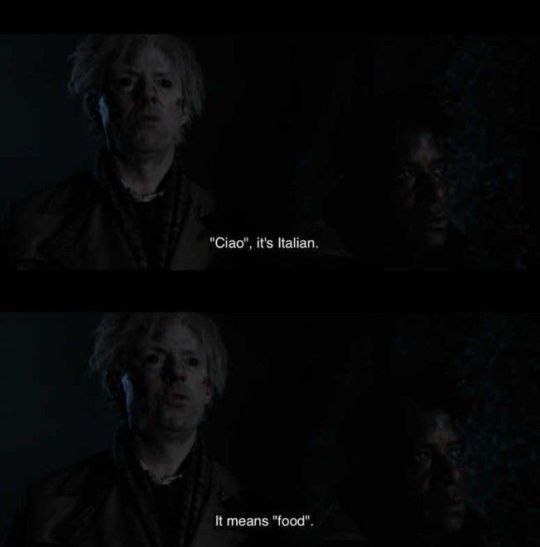

They sort of are, yes. Idiots who either forgot to turn on their own auto-translator, or idiots who aren't aware that they have one for other languages except English, or idiots who were miffed that Crowley actually knew-knew a word in another language and didn't want to admit that they didn't.
Où est la plume de la jardinière de ma tante?

Right, so. The exchange that fuelled this meta. First of all, as a funny side note, the origin of that peculiar sentence:
La plume de ma tante ("my aunt's quill") is a phrase in popular culture, attributed to elementary French language instruction (possibly as early as the 19th century) and used as an example of grammatically correct phrases with limited practical application that are sometimes taught in introductory foreign language texts. As Life magazine said in 1958, "As every student knows, the most idiotically useless phrase in a beginner's French textbook is la plume de ma tante (the quill of my aunt)." The phrase is also used to refer to something deemed completely irrelevant. [link]
So basically, it's historically the most nonsensical and dumb phrase any student of the French language gets taught. And yet Aziraphale has been "wittering on about it for the last 250 years". Even looking smug about it, to this very day. Gave me a good chuckle.
Also:
In the 1973 horror film The Exorcist, Catholic priest Damien Karras interviews [...] a girl believed to suffer from demonic possession. While Karras probes to determine whether the possession is a hoax, the demon Pazuzu—who has possessed the girl—speaks in Latin and French, languages presumably unknown to the girl. When Karras demands "Quod nomen mihi est?/What is my name?" in Latin, the demon exclaims "La plume de ma tante!", using the phrase as a non sequitur to mock and evade Karras' line of questioning. [link]
Using that particular phrase to avoid answering a question you're being asked? Like: "You speak every language in the world perfectly ...
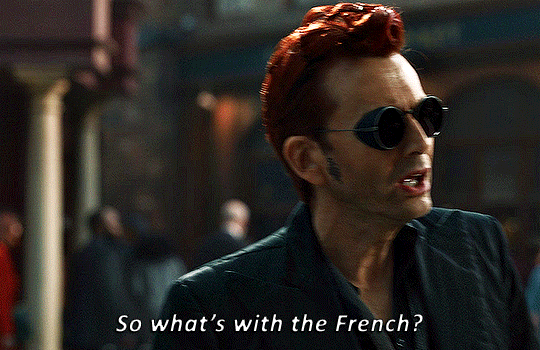
Neil, Neil, Neil, *shakes head fondly*, is there anything that you don't give layered meaning to, ever? No. No, of course you don't. And I adore you for it.
The whereabouts of the aunt's gardener's pen questioned, Aziraphale then says "But you still understood me" when Crowley calls him out for his bad French.
This is curious and affirming of my auro-translator theory for two reasons:
1) Aziraphale wouldn't have said this if he'd uttered this sentence in the language of Angels and simply hit the auto-translate button. Because if he had done it that way, of course Crowley would have understood him. But the reason Crowley understands him is not because Aziraphale used his language auto-translate, but because, again, Aziraphale, for two hundred and fifty years, has been wittering on about the plume of his imaginary tante.
2) Point one is further proven by a tiny French nerdy fact I can provide because I actually did learn and graduate in French back in school, lol. Because Crowley actually makes a mistake while trying to not-automatically translate the sentence. He says:
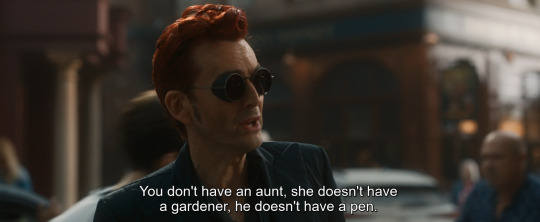
But "jarndinère" is actually a female gardener (le jardinier = male, la jardinière = female). So, when Crowley says "he doesn't have a pen", he actually gets it wrong, which further proves to me that he (as well as all other angels and demons) doesn't actually understand the phrase like someone does who has learnt the language in a human way.
Crowley doesn't have the automated translation on in this moment, so he doesn't translate it correctly. Because he doesn't actually speak French. At least not in the sense that us humans interpret "speaking a language".
Comment ça?
Basically, what I'm trying to get at is: Would you say that Google Translate speaks every language in the world? That it's native and fluent in every tongue ever spoken? Or is it simply a program that can access all the language knowledge its been fed and as soon as you hit enter, it translates any and every language back to you?
Google Translate never learnt any language, it never sat down and went through the onslaughts of vocabulary and grammar that studying a language comes with. It never got frustrated with seemingly nonsensical sentence structures, subjonctifs (French-learnes, you know what I mean) tenses and conjugations. It never spent ages trying to understand different dialects and accents, never spoke with natives to figure out the hidden slangs and sarcasms that would never be translated on paper. It never went to night classes where the teacher wittered on about pens and gardeners and aunts.
No. Google Translate is being told a sentence and it soullessly, programatically recognizes the language through its binary coded translation filter and mirrors the equivalent in whatever other language you want it to.
It's furthest any-a thing could be from speaking a language.
And exactly like that.
Exactly like that is how angels and demons "speak" every language in the World. Hitting an imaginary auto-translate-and-auto-recognition button.
Aziraphale and French (and magic)

Just like with Aziraphale being giddy about the idea of human magic, of learning card tricks and pulling coins out from behind ears, Aziraphale chose to never hit his translate button when it came to French.
Why does Aziraphale learn magic the human way?
Because he knows how to do it the ethereal way but that's "no fun."
And why does Aziraphale learn French the human way?
Because he knows how to do it the ethereal way, but that's "no fun".
Let me recap real quick: Two of the very base principles of any angel's job and/or purpose (on Earth) is to 1) do miracles for humankind to ensure their souls will at some point be added to Heaven's tab and 2) be a being of Love and love all of Her creations.
Or, the condensed version: Magic and Love.
And what are the two things Aziraphale finds no fun (= boring and unsatisfying) to do the way it was intended for all angels?
Magic and (the language of) Love.
Aziraphale chose to try and learn magic as well as the language of love organically, without the God-given ability and the binary coded translation system Heaven provided his corporation with.
He wanted to learn it the human way. The hard way. The fun way.
Neil: "It's like magic tricks, which he is terrible at but loves to do, and miracles, which are no fun, but which he does very well."
Because that's the point, isn't it? Most of us think: "Wow, wouldn't it be great to be able to do actual magic? Simply snap your fingers and have any-a wish come true? Speak every and any language in the universe and never have to pick up a dictionary ever again?"
Sure, for the first few exciting moments, miracles and conversations maybe. But sooner or later, it renders everything meaningless. Soulless. Flavourless. And who loves flavour more than Aziraphale?
It's somewhat similar to why typing a sentence into Google Translate is never going to be as exciting as being able to finally translate it yourself after years of practising. Or why telling an AI to conjure up a picture of a beautiful landscape will never, ever be the same as working years on your own painting skills to one day finally be able to paint it yourself.
Heaven (and ultimately Hell) don't care about the process. The hardship. The pain and passion of putting work and effort into the journey. They only care about the end result. The means to an end.
Crowley: "They don‘t care how it gets done, they just want to know they can cross it off their list."
Want to speak any language in the world? There you go, automatic translator. Want to ensure humans will be added to the Heavenly/Hellish soul tab? Boom, you can do real magic. Get to work, then!
So, for Aziraphale to choose to learn the two things he was provided with to do his Heavenly work in the most efficient, soulless and flavourless way possible the human way instead, really says it all, doesn't it?

But he learnt the most important one the hard way, without his auto-translator.
The one language all angels are supposed to know fluently and wordlessly anyway.
The one language that makes an angel.
The language of Love.
Except that when it's programmed into you with the intent to only ever work as a means to and end instead of the beautiful journey it is, it will never be the real, organic, passionate, hard and wonderful thing it was meant to be.
And Aziraphale knows this.
Which is exactly why he learnt magic and French the real, human way.

***
Small addendum that I couldn't really fit into any paragraph up there: I think it's also really telling that Aziraphale only properly committed to learning French the right way by going to Monsieur Rossignol's (for those who haven’t seen it yet: rossignol means nightingale in French) night classes in 1760 after the first time we see Crowley rescue him (Bastille, 1739). There might have been a time before that where Crowley got him out of a precarious situation, but for all we know, it was the first one where Crowley really showed up for an angel in need who was absolutely swooning over it. Time to let the nightingale to teach you how to become fluent in Love!
#good omens#good omens meta#my own meta#good omens season 2#good omens 2#gos2#go2#good omens s2#crowley#aziraphale#ineffable husbands#language#good omens language#why?#love#aziraphale is a romantic#and also the only good angel out there#and all of it because of a god damn pen
74 notes
·
View notes
Text
Good Omens, or the Disruption of Gay = Death
CW: historical homophobic violence and death
@queerfables recently wrote an excellent meta on slash fiction and the concept of "Taking Away the Glass". I had some thoughts, which I was going to add as a reblog, but this seems to spiraled away from the original post, so I'm posting this on its own, but I'm referencing their ideas and references, so maybe go read that first.
This is especially for those of you who are, say, under 25 (which is apparently most of Tumblr), and who haven't had much opportunity to learn queer history. Let me say, I'm not a queer historian. I am a queer who has lived through recent history and can reasonably clearly remember the last at least 35 years of it, and I was fortunate to have had schooling that did include some earlier queer history and didn't shy away from queer topics. (I recognize now what a revolutionary bit of teaching that was.)
I also want to acknowledge that I'm writing from a place of relative privilege, as a white cis woman living in a progressive part of North America, and that some of what is history for me is still life for others. I am speaking from my own personal experiences here -they are by no means universal. But I think it's important for us to share our stories, so this is part of mine.
When You're Dying in America, at the End of the Millenium
Fables quotes a video by thingswithwings as saying "Homosexuality, or just loving touch between two people of the same gender, is equivalent to death in this media narrative." In the 1980s and 1990s, when Good Omens was written and first published, that wasn't a metaphor. When I was a baby proto-queer, what I heard about being gay was that it killed you.
My formative memories of what it meant to be gay weren't pride parades or even riots. It was gay men dying by the thousands and governments and religious leaders ignoring them at best, and welcoming their deaths at worst. To be gay, and a gay man in particular, was to be marked for death. It wasn't until a straight white boy who got it from a blood transfusion died that AIDS became something that "normal" people had any empathy for and governments really started to act.
The gay representation I rember in the media as a moderately sheltered child from the 80s and 90s with left-of-center middle class white parents was news about AIDS, Philadelphia (death from AIDS), Ellen (cancelled after she came out), and eventually RENT (desperately trying not to die of AIDS or capitalism). I knew a very small handful of out gay adults, and no trans adults at all.
My first time being in a large group of queer people was a vigil for Matthew Sheppard, who had been beaten and left to die tied to a fence. I remember being terrified. I wasn't out yet. I knew people who hated us might be there, this group of mostly young queer people gathering with candles to cry over a boy we'd never met, and over the many others who had died just for being what we were. I'd never even kissed a girl yet. I only knew my queerness in relation to death.
In the last decade or so of the 20th century, being queer was about grasping any bit of joy you could from a world that very clearly would prefer you were dead. It was defiance and anger and fear every time you held your love's hand, or kissed them in public. My second date with the person who would become my spouse was interrupted by some dude in a truck shouting slurs at us was we walked down a quiet street. We laughed it off - no one had thrown anything, or beaten us, so it wasn't a big deal. It should have been a big deal, but we couldn't let it be. When you're marked for misery and death, you can't let the little things get to you. You just hold each other's hands as tightly as you can and defiantly keep walking.
An Angel and a Demon and Immortality
Good Omens was written during some of the darkest days of the AIDS epidemic (which is still ongoing, by the way), before there were effective treatments, when gay = death. It is a mainstream, mass-market book. It wouldn't be shelved in the "Gay and Lesbian" section at the book store, it would be shelved with humour, or possibly fantasy.
And yet, here we have these two beings. An angel and a demon, with an unlikely friendship, and who are very clearly written as gay. Or, at least, as percieved as gay by outside observers. Aziraphale in particular is (in one of my favorite lines) "gayer than a tree full of monkeys on nitrous oxide," and "THE southern pansy" (self-proclaimed). Together, they are "consenting bicycle repairmen" (Neil Gaiman's explanation for context) who Anathema was safe with the whole time.
Whether you caught the subtextual shippyness of their relationship (and to be honest, I only did a little when I first read it), they were very obviously written as precieved-gay characters, in a story where their precieved gay-ness wasn't the cause of their downfall. Yes, an 11 year old calls Aziraphale a faggot. But he doesn't get arrested or beaten of killed - he just gets covered in cake. And he loves cake! The attempted insult just rolls off him like water off a duck's back, because he has no pressure not to be visibly gay.
Becuase, see, unlike us humans, unlike his gay contemporaries, he is not marked for death. He's an angel. He's immortal. Even more, he was made by God, exactly how God wanted, presumably, and that is intelligent, English, and so very gay.
Niel and Terry are saying so much here. You can be gay and loved. You can be gay and have a deep relationship. You can be gay because that's how God made you. You can be gay forever, through all time, with someone beside you, finding joy in your life.
You can be gay and not die. You can be gay and live.
#good omens meta#queer history#aids history#this one's personal#neil gaiman#terry pratchett#death#hiv/aids#homophobia
63 notes
·
View notes
Text
A Night to Remember
Aziraphale (about the ball he's planning):

A Night to Remember:
A book by Walter Lord, published in 1955. It is a non-fictional account of what happened on board the Titanic before and during the catastrophe (it was also made into a movie in 1958). Sinking ship, sounds familiar? Check out my post on Good Omens and Lord Jim.
In A Night to Remember, the author uses interviews with 63 survivors of the catastrophe and other first-hand accounts to weave together a realistic account of what happened to the Titanic and its passengers. How is this relevant to GO? Well, the author of the book got praise for his unconventional treatment of chronology, time and space (check out my post on GO queering plot/narrative).
Apparently, he used a multitude of perspectives to present the same event from different POVs, creating multiple narratives that are arranged in a way that juxtaposes contradicting facts and emotions. And what for? To show the “human element” of the disaster rather than the mythology of it. Sounds familiar?
I find this intertextual reference especially intriguing seeing as Aziraphale’s dance in the bookshop is followed by disaster, and Aziraphale (the captain of this particular metaphorical ship) is too enmeshed in his fantasy of love and romance that he does not see the danger ahead, even when warned by Crowley. And obviously the consequences of that particular night are far-reaching.
Here's a bonus quote from Wikipedia:
“Lord updates the popular interpretation of the Titanic disaster by portraying it in world-historical terms as the symbolic and actual end of an era, and as an event which "marked the end of a general feeling of confidence." Uncertainty replaced orderliness, and the ship's sinking marked the beginning of the twentieth century's "unending sequence of disillusionment. Before the Titanic, all was quiet. Afterward, all was tumult."

But not enough: “A Night to Remember” is also a Song by Shalamar from 1982:
When you love someone, it's natural, not demanding
And that's one thing I'm proud to say I've found in you
I'm so glad we reached an understanding
Now I know my heart is safe with you, ooh
So now my love to you, baby, I surrender
Get ready, tonight
Gonna make this a night to remember
Get ready, oh, baby, tonight
Gonna make this a night to remember
Celebrations in the heart 'cause we're united
And there's nothing in this world to come between me and you
We're together, and it keeps me so excited
To think of what the power of love can do, ooh
And I'm filled with a love that's, oh, so tender
…
This night you won't forget
Gonna make this a night to remember
'Cause your love I won't regret
Gonna make this a night to remember
Get ready, (baby) tonight (darling)
Gonna make this a night to remember
Get ready, (it won't be like the past) tonight (I will make it last)
Gonna make this a night to remember
Let's make a toast to those who helped make this occasion
They turned their back on love, and that's what drove you straight to me
Now to you I make a lasting dedication
I'll show you all that love and life can be, ooh
And each day that I live I will deliver
Get ready, (this night you won't forget) tonight
Gonna make this a night to remember
Get ready, ('cause your love, I won't regret) tonight
Gonna make this a night to remember
Get ready, (baby) tonight (darlin')
Gonna make this a night to remember
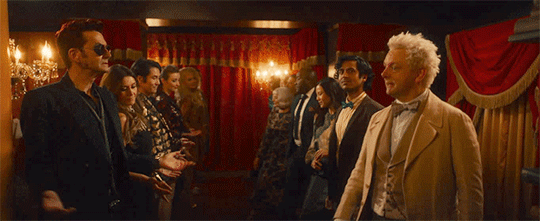
In my reading, this is how Aziraphale feels during the dance. He is totally caught up in the fantasy of “a love that’s, oh, so tender” and he really makes this grand gesture to make it a night to remember for him and Crowley. The lines that get me most here are “I’m so glad we reached an understanding” (oh no), “to think of what the power of love can do” (a 25-lazarii miracle, perhaps?) and “Now to you I make a lasting dedication/ I'll show you all that love and life can be, ooh/ And each day that I live I will deliver” (I am sure this is what Aziraphale is trying to prove to Crowley all the time, in his own way …)
#go2#good omens#good omens s2#aziraphale#crowley#good omens 2#ineffable husbands#neil gaiman#crowley x aziraphale#good omens meta#go meta#good omens spoilers#good omens 2 spoilers#good omens season 2#titanic#a night to remember#thank you neil gaiman#go2 meta#meta#queer#intertextuality
78 notes
·
View notes
Note
Hey Neil,
I’m rereading Good Omens and I’ve just come to the part where Famine joins War at the diner and there’s mention of the 1969 dope famine of SF. Ever since i found out that the Sleepy Sickness referenced in the Sandman was real I’m sus whenever you reference a historical event so i googled it
(i’m 85% sure the dope famine was real but i also didn’t look that hard, sue me)
i guess my question is kinda which came first, the chicken or the egg, i.e., did you (or Terry in this case) learn about it prior to writing, or did you do some research into famines for the character and found reference to that one?
I hope you’re doing well!

I was a huge Gilbert Shelton fan, and learned many things from Gilbert Shelton comics. So I knew about that one before I wrote that bit.
923 notes
·
View notes
Text
Richard Speight Jr.: It's curious, because in the research we found out Kripke talked about Good Omens being an influence on this episode, and I don't know that book well enough to know how that plays out. Is that something that you reference at all, or is that merely a Kripke thing that gave him the idea and he passed it along to you and you went your merry way?
Andrew Dabb: You know, [Eric] Kripke had referenced [Good Omens]. I had not read it until he referenced it, and as someone who was a Sandman fan and everything else, I just hadn't taken a look at it, but where that came from...so with Good Omens it's interesting because there's a character in there - and I can't remember his name right now - but he ends up, the little boy who gets the hellhound and everything else, and that character kind of became a bit of an inspiration for the Jesse character here.
You know, the Neil Gaiman stuff - and Eric's been very open about it - was a huge inspiration for a lot of Supernatural. The angels, John Constantine, and Crowley - whose name is taken from Good Omens - and it's just that way of thinking about biblical things in a real world, kind of much more down to earth concept. I think it really helped him and all of us kind of wrap our heads around the idea of doing demons and angels, especially angels, because demons were part of the story for quite awhile. They really lend themselves to our world, whereas angels usually, like, historically, they got wings and halos and they're flying around playing harps and all that kind of stuff, how do you ground it? And so that idea of how Neil Gaiman handled Lucifer in Sandman, and then in Good Omens demons, and then a lot of John Constantine stuff with Alan Moore, like all that stuff really informed a lot of early Supernatural and really the core of Supernatural and its DNA.
Source: "I Believe The Children Are Our Future with Andrew Dabb (S5EP6), Supernatural: Then and Now podcast (23:50-25:26).
For every $10 you donate to Undue Medical Debt, you will 1) be erasing about $1,000 in medical debt and 2) be able to enter our raffle to win items like this hardcover edition of Good Omens signed* by Neil Gaiman:


*Thank you to the staff at The Golden Notebook in Woodstock, NY for being extremely helpful and kind.
#supernatural#good omens#neil gaiman#the sandman#hellblazer#andrew dabb#eric kripke#richard speight jr#5x06#supernatural then and now podcast#admin: lets-steal-an-archive
21 notes
·
View notes